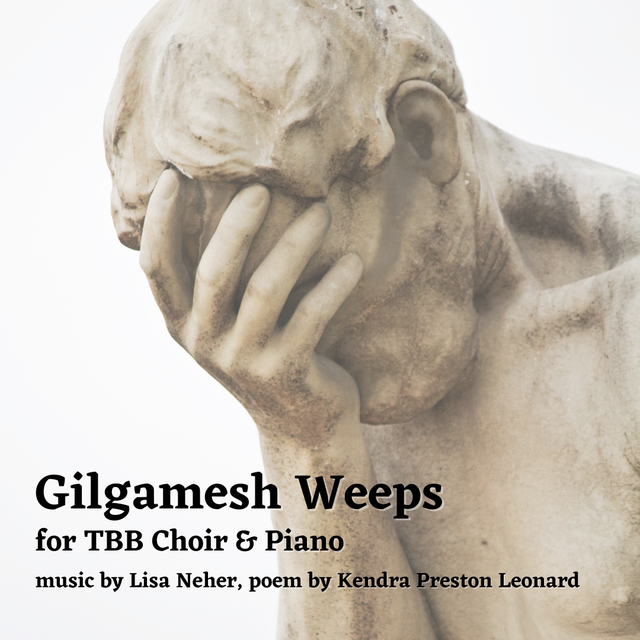- Choral
- >
- Tenor Bass Choir
- >
- Gilgamesh Weeps (TBB & Piano)
Gilgamesh Weeps (TBB & Piano)
SKU:
$2.00
$2.00
Unavailable
per item
Choral | TBB Choir & Piano | 4 1/2'
Please note: 10 copy minimum. Please purchase one copy per member of your choir.
Product Description:
DF score of Gilgamesh Weeps for TBB Choir and Piano by Lisa Neher and Kendra Preston Leonard.
Please note: 10 copy minimum. Please purchase one copy per member of your choir.
Please note: 10 copy minimum. Please purchase one copy per member of your choir.
Instrumentation:
TBB Choir and Piano
Difficulty Level:
Intermediate
Program Note:
Gilgamesh Weeps explores love, devotion, and loss between friends. The music and text upend hero stereotypes by portraying the mythic warrior Gilgamesh in tears, mourning his friend Enkidu’s death. Like keening moans, the descending motives in the opening and closing sections evoke Gilgamesh crying, while the middle section’s percussive ostinatos paint musical images of the precious drum that Enkidu sacrificed everything to find. Gilgamesh Weeps was commissioned by and is dedicated to the Tenor/Bass Choir at University of Wisconsin Oshkosh and Dr. Shannon Gravelle, Director.
--Lisa Neher, composer
This piece draws on the Sumerian poem "Gilgamesh, Enkidu, and the Netherworld,” which tells of how a mythic Mesopotamian king, Gilgamesh, aids his sister, the goddess Inanna, by driving away unwanted beings in her willow tree. For this, she gifts him a “mikku” and a “pikku,” thought to be a drum and sticks or beaters for the drum. But Gilgamesh is careless and he loses these items. His devoted friend Enkidu offers to find them, and enters the Netherworld to do so. But the Netherworld has rules: once you’re in, you can never leave. Enkidu’s ghost is able to rise to the surface world briefly, where he tells Gilgamesh of the horrible conditions of the Netherworld. Other writings about Gilgamesh exist, including the Epic of Gilgamesh, which tells this story in a rather different way.
--Kendra Preston Leonard, lyricist
--Lisa Neher, composer
This piece draws on the Sumerian poem "Gilgamesh, Enkidu, and the Netherworld,” which tells of how a mythic Mesopotamian king, Gilgamesh, aids his sister, the goddess Inanna, by driving away unwanted beings in her willow tree. For this, she gifts him a “mikku” and a “pikku,” thought to be a drum and sticks or beaters for the drum. But Gilgamesh is careless and he loses these items. His devoted friend Enkidu offers to find them, and enters the Netherworld to do so. But the Netherworld has rules: once you’re in, you can never leave. Enkidu’s ghost is able to rise to the surface world briefly, where he tells Gilgamesh of the horrible conditions of the Netherworld. Other writings about Gilgamesh exist, including the Epic of Gilgamesh, which tells this story in a rather different way.
--Kendra Preston Leonard, lyricist
Recording:
Score:
Text:
Gilgamesh Weeps
by Kendra Preston Leonard
Gilgamesh the warrior,
Gilgamesh the great
—ah!--
he weeps:
this bearded brawling drum-beating man--
he weeps.
He hangs his head,
all sorrow,
all tears.
He does not hide
his trembling hands.
For Enkidu, friend to Gilgamesh--
comrade Enkidu
has dived
to
the Underworld
to find a drum that
Gilgamesh
has lost.
But there are rules in the Underworld,
rules neither friend knew,
and now friend Enkidu
can never leave alive.
Gilgamesh misses,
he loves
his friend Enkidu.
Gilgamesh weeps
and that is right and good.
by Kendra Preston Leonard
Gilgamesh the warrior,
Gilgamesh the great
—ah!--
he weeps:
this bearded brawling drum-beating man--
he weeps.
He hangs his head,
all sorrow,
all tears.
He does not hide
his trembling hands.
For Enkidu, friend to Gilgamesh--
comrade Enkidu
has dived
to
the Underworld
to find a drum that
Gilgamesh
has lost.
But there are rules in the Underworld,
rules neither friend knew,
and now friend Enkidu
can never leave alive.
Gilgamesh misses,
he loves
his friend Enkidu.
Gilgamesh weeps
and that is right and good.

